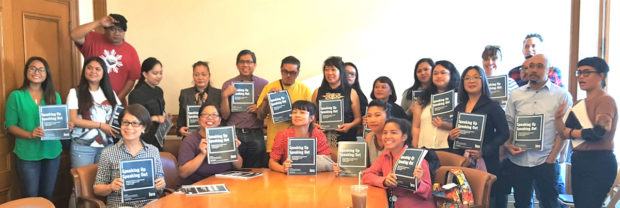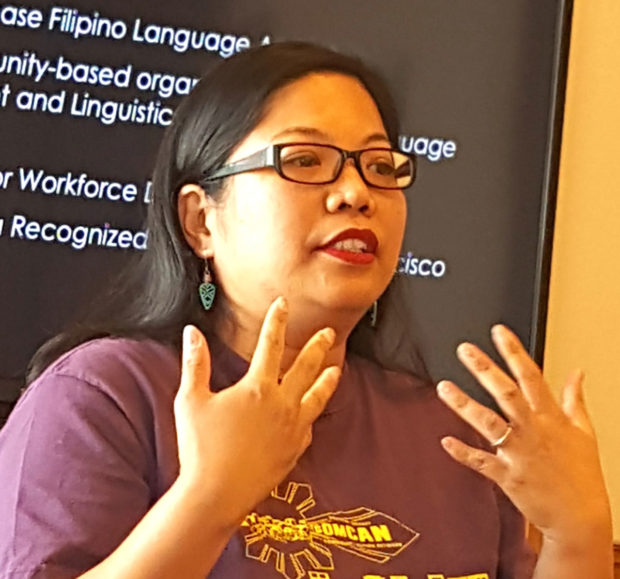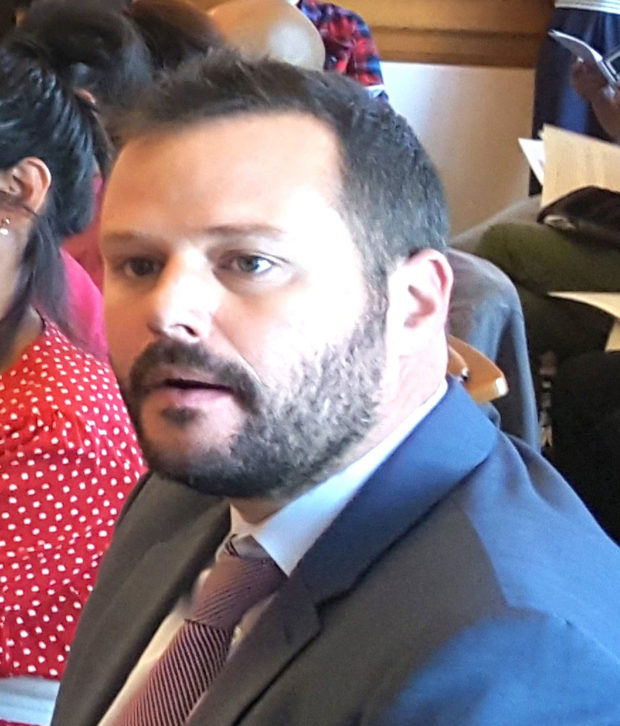San Francisco still lags in providing Filipino language access to city services

Members of different community-based organizations are doing two to three other tasks to help their clients seek the services they need. INQUIRER/Jun Nucum
SAN FRANCISCO — All city departments still need to fully implement required Filipino language access in providing information or services to Filipinos who need them the most, a study reports.
The year-old study evaluates the needs of non-English proficient (LEP) Filipinos and in San Francisco and the barriers they face.
The report Speaking Up Speaking Out was prepared by San Francisco State University Department of Sociology and Sexuality Studies assistant professor Dr. Valerie Francisco-Menchavez, PhD in collaboration with South of Market Community Action Network (SOMCAN).

San Francisco State University assistant professor Dr. Valerie Francisco-Menchavez prepared the report on the need for full implementation of Filipino language access in San Francisco. INQUIRER/Jun Nucum
There is still uneven implementation of the city’s Language Access Ordinance (LAO) in delivering materials and information in Filipino, even though LAO should have been fully implemented by December 31, 2015.
The Office of Civic Engagement and Immigrant Affairs (OCEIA) on April 2, 2014 had certified Filipino as San Francisco’s third language spoken by “10,000 limited English-speaking city residents who speak a shared language other than English.”
“They are in dire need of language access through simple materials, flyers and basic information on housing, benefits, health care, senior activities and youth education, among others. Ninety-nine% of Filipinos seeking services need someone [who also] speaks Tagalog and they all need [English] translation,” Menchavez stressed.

South of Market Community Action Network (SOMCAN) Executive Director Angelica Cabande reports that Filipinos are still struggling to get the resources and support that they need. INQUIRER/Jun Nucum
As a result, staff members of Filipino community-based organizations who assist such clients have often had to accompany clients to city departments to serve as interpreters or even liaisons as the city lacks interpreters.
“This report is an encouragement for the city to take up the work of translation and interpretation for the various needs of the Filipino community,” disclosed Menchavez.
Other findings of the report reveal that even if English is widespread use in the Philippines, in making important decisions Filipino immigrants still comprehend details better in Filipino. There is also the risk of having Filipinos not integrated into the political and social life of San Francisco because they are lacking in interpretation and translation.

San Francisco County Supervisor Matt Haney conceded that the Filipino community still needs access to economic and housing stability as well as culturally and linguistically appropriate social services. INQUIRER/Jun Nucum
“The report basically says that the city has to fund more interpretation and translations services whether it is from the community-based organizations or city department because Filipinos need the basic services they are entitled and afford to them when they live here in San Francisco,” reiterated Menchavez. She added that the recommendations are not a matter of budget but of legality.
Lending his support, San Francisco County Supervisor Matt Haney said, “(Since) 2014, Tagalog has been a required language for city services, interpretation and translation, it has not been easily accessible and that hampers communication and delays services for predominantly Tagalog-speaking residents.”
SOMCAN Executive Director Angelica Cabande clarified, “And it is not about speaking or understanding English. It is about do we understand the documents that we are reading?” Cabande.
Bayanihan Equity Center Executive Director/Secretary Luisa Antonio agreed, saying many of her elderly clients were World War II veterans, teachers and professionals in the Philippines who have reverted to using their native tongue. “Usually, seniors are left to fend for themselves (in trying to) understand why they are being denied certain services.”

